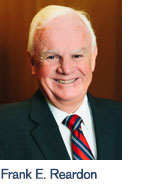 |
THIS ISSUE'S HEADLINES
Password Sharing May Be A Crime
Not-for-Profit to "Pot-for-Profit" — Important Changes in MA's Legal Cannabis Industry
True Deadlock: A Lesson in Dodging Bullets
Announcing Expansion of Health Care Law Team and Strategic Alliance

PASSWORD SHARING MAY BE A CRIME
Amid the flurry of recent news about computer hacking and data breaches, a recent lawsuit quietly wound its way up to the steps of the United States Supreme Court. In that case, a former employee left his employer to open a competing business. After he left, he asked his assistant at his old firm to lend her login credentials to him so that he could  access his former employer’s database. He then used her password to log into his old firm’s database. His former employer launched an investigation and reported him to the authorities. access his former employer’s database. He then used her password to log into his old firm’s database. His former employer launched an investigation and reported him to the authorities.
The federal government charged the former employee with various crimes, including violations of the Computer Fraud and Abuse Act (CFAA). The CFAA makes it a crime to access a computer “without authorization” or “exceeding authorized access.” Therefore, the question in that case was: did the fact that the assistant allowed the former employee to use her login credentials constitute valid “authorization,” or, did her permission not matter because the true owner of the database (i.e., the former employer) did not authorize this type of access? A jury convicted the former employee, finding that he violated the CFAA even though he accessed a computer using an authorized person’s login credentials (i.e., his former assistant’s password).
The Supreme Court recently refused to hear the former employee’s appeal of his conviction, which leaves open substantial questions for employers, such as whether they have (or should have) policies in place to handle password-sharing, computer-sharing, or the sharing of handheld electronic devices among employees. Such day-to-day innocuous activities, such as giving your assistant your password in order to print an email, for example, may technically violate the CFAA, especially if your employer prohibits password sharing. Therefore, employers should take a look at their current technology policies and consider whether they need to update them to clarify the employer’s expectations with respect to the privacy of passwords, sharing of accounts, or sharing of devices. Otherwise, employees might unwittingly be exposing themselves to criminal prosecution under CFAA. For more information on this important issue for your organization and other business or employment law matters, contact PLDO Partner Brian J. Lamoureux at 401-824-5100 or bjl@pldolaw.com.
[back to top]

NOT-FOR-PROFIT TO “POT-FOR-PROFIT” – IMPORTANT CHANGES IN MA’S LEGAL CANNABIS INDUSTRY
When the Commonwealth of Massachusetts first established the framework for its legal marijuana industry, Massachusetts law required dispensaries to form and operate as nonprofit corporations. This mandate forced founders and angel investors alike to implement overly complex corporate structures to legally stream revenue out of the nonprofit corporation to investor controlled entities to make investment in this high-risk industry palatable.  A common example included the creation of for-profit management companies providing management and consulting services to the dispensary for a price, controlled by the very same parties providing seed monies to the nonprofit dispensary. Also, commonplace were investor-owned real estate holding companies which would lease space to the nonprofit dispensary, in turn generating reliable rental income for investors as an alternative means to see a return on their investment. Frequently, these contractual arrangements were used in tandem. The need for these complex corporate relationships, however, is obviated by a recent change in Massachusetts law. A common example included the creation of for-profit management companies providing management and consulting services to the dispensary for a price, controlled by the very same parties providing seed monies to the nonprofit dispensary. Also, commonplace were investor-owned real estate holding companies which would lease space to the nonprofit dispensary, in turn generating reliable rental income for investors as an alternative means to see a return on their investment. Frequently, these contractual arrangements were used in tandem. The need for these complex corporate relationships, however, is obviated by a recent change in Massachusetts law.
Last month, the Massachusetts Department of Public Health (DPH) - the regulatory body which oversees the Commonwealth’s marijuana industry - released a guidance document outlining the steps by which a nonprofit dispensary may convert to a for-profit entity. This guidance document comes in the wake of a recent change in the law providing dispensaries with a statutory right to convert. The change in framework now allows investors to hold equity in dispensaries and to see direct profit distributions from their investments, thereby cancelling the need to implement traditional contractual relationships used in the industry.
While at first glance, the DPH guidance document appears to make the conversion process simple and straightforward, conversion is certainly not a simple as filing a form with the DPH. Dispensaries looking to convert from nonprofit to for-profit should be leery of undertaking the process in the absence of legal counsel. Beyond the regulatory processes in place with the DPH, conversion also implicates other Massachusetts’ laws and, if done incorrectly, could unnecessarily create tax consequences for investors. For example, the issuance of stock to investors when converting, if done incorrectly, could lead to large taxable events at both the federal and state levels. Accordingly, it is extremely important that investors and nonprofits considering for-profit conversion seek competent legal counsel from a well-rounded attorney with industry, corporate conversion and tax planning experience. To reach PLDO Partner Benjamin L. Rackliffe and Attorney Joel K. Goloskie to discuss this issue or other business matters, call 401-824-5100 or email brackliffe@pldolaw.com or jgoloskie@pldolaw.com.
[back to top]

TRUE DEADLOCK: A LESSON IN DODGING BULLETS
Deadlock. Impasse. Stalemate. There are few words more dreaded to a corporate director (except maybe “SEC investigation”). What to do when the power brokers in a company just can’t agree is a problem that plagues business planning experts and litigators alike. Spoiler alert: there are ways to dodge the bullet of corporate deadlock by way of savvy business planning. But what happens when directors are already at the point of no return?
 The Massachusetts Supreme Judicial Court (SJC) answered this question recently in Koshy v. Sachdev, which dealt with a contentious fight between the two shareholder-directors of a close corporation. 81 N.E.3d 722 (Mass. 2017). One director filed a lawsuit seeking corporate dissolution pursuant to Mass. Gen. Laws ch. 156D, § 14.30. The trial court rejected the director’s claim that the parties were deadlocked, but the SJC reached the opposite conclusion: that the two shareholder-directors were in a state of “true deadlock,” and that dissolution could be an appropriate remedy. The Massachusetts Supreme Judicial Court (SJC) answered this question recently in Koshy v. Sachdev, which dealt with a contentious fight between the two shareholder-directors of a close corporation. 81 N.E.3d 722 (Mass. 2017). One director filed a lawsuit seeking corporate dissolution pursuant to Mass. Gen. Laws ch. 156D, § 14.30. The trial court rejected the director’s claim that the parties were deadlocked, but the SJC reached the opposite conclusion: that the two shareholder-directors were in a state of “true deadlock,” and that dissolution could be an appropriate remedy.
Koshy was the first time the SJC interpreted the state’s corporate dissolution law, and the decision is a useful guide to what constitutes “true deadlock” under the statute. Pursuant to Mass. Gen. Laws ch. 156D, § 14.30, “true deadlock” requires (1) deadlock in the management of corporate affairs; (2) inability of shareholders to break the deadlock, and (3) the threat or existence of irreparable injury to the company.
Expanding on these three criteria, the SJC first noted at least four factors relevant to determining whether deadlock exists. Specifically, it highlighted: (a) “corporate paralysis” affecting the primary functions of management, like hiring, firing, and payroll, as a result of the deadlock; (b) company size, with small companies more likely to experience deadlock; (c) whether a party “engineered” a deadlock by manufacturing disputes, which should weigh against finding a deadlock; and (d) the degree and extent of distrust and hostility between directors.
The company in Koshy hit all the right (or wrong) notes: an inability to agree on basic matters like staffing; a grand total of two shareholders; no evidence that either party “engineered” the dispute, but rather that it grew out of genuine disagreement; and a record “replete with personal insults, questioning of motives, and general acrimony,” enough to satisfy any inquiry into the hostility between them.
The SJC also saw that there was no way for the shareholders to work around the deadlocked directors. The company’s governing documents had no buy-sell agreement, and the alternative dispute resolution provision required the parties to agree to an arbitrator, which the SJC felt certain would never happen. Last, the SJC found that the stalemate between directors “cast a cloud” on the future of the company and threatened irreparable injury.
Ultimately, the SJC concluded that the directors had reached a state of “true deadlock” under Mass. Gen. Laws ch. 156D, § 14.30. It also determined that dissolution of the company was a potential—but not compulsory—remedy, returning the case to the trial court to fashion an appropriate solution.
Of note, a buy-sell agreement in the company’s governing documents could have avoided this bitter court battle. In fact, the shareholders did try to buy each other out, but didn’t agree on the value of their respective shares. Worse still, their alternate dispute resolution method required them to agree on an arbitrator at a time when they couldn’t agree on anything at all.
Your business doesn’t have to go the way of Koshy. Make sure you have a plan in place if your directors reach an impasse, and dodge the bullet of true deadlock. For information on business planning best practices, buy-sell agreements or other business matters, contact Attorney Samantha M. Vasques at 401-824-5100 or email svasques@pldolaw.com.
[back to top]

ANNOUNCING EXPANSION OF HEALTH CARE LAW TEAM AND STRATEGIC ALLIANCE
 PLDO’s approach to modern legal representation includes bringing entrepreneurial business principles and innovative excellence to the practice of law. Consistent with this philosophy, the law firm recently formed a strategic alliance with prominent health care attorney and litigator, Frank E. Reardon, who practices in Rhode Island and Massachusetts, and his firm, Reardon Law Office, LLC, to better serve an expanding base of clients in the New England market. The combined strength of Attorney Reardon and PLDO delivers a wide range of legal assistance and advising on the myriad of business and health care law issues confronting physicians and health care organizations in today’s complex health care environment. PLDO’s approach to modern legal representation includes bringing entrepreneurial business principles and innovative excellence to the practice of law. Consistent with this philosophy, the law firm recently formed a strategic alliance with prominent health care attorney and litigator, Frank E. Reardon, who practices in Rhode Island and Massachusetts, and his firm, Reardon Law Office, LLC, to better serve an expanding base of clients in the New England market. The combined strength of Attorney Reardon and PLDO delivers a wide range of legal assistance and advising on the myriad of business and health care law issues confronting physicians and health care organizations in today’s complex health care environment.
Attorney Reardon has a distinguished 30-year career as a health care practitioner and is highly regarded as a scholar in his areas of practice, having published extensively on health care legal issues. Recently, he was featured in Rhode Island Small Business Journal in a Q&A article, entitled “Going to Court” with Health Care – What Organizations Need to Know. In the article, Attorney Reardon, who is Of Counsel at PLDO, addresses keys to avoiding the high cost of litigation, how federal and state laws have changed the landscape in employment law in health care as well as other industries, and other issues such as the phenomena of medical providers becoming business owners. To read more about Attorney Reardon’s legal background, leadership roles in the health care industry and scholarly works, click on his bio here. He is also available at 401-824-5100 or by emailing freardon@pldolaw.com.
[back to top]
|
 |


 access his former employer’s database. He then used her password to log into his old firm’s database. His former employer launched an investigation and reported him to the authorities.
access his former employer’s database. He then used her password to log into his old firm’s database. His former employer launched an investigation and reported him to the authorities.

 A common example included the creation of for-profit management companies providing management and consulting services to the dispensary for a price, controlled by the very same parties providing seed monies to the nonprofit dispensary. Also, commonplace were investor-owned real estate holding companies which would lease space to the nonprofit dispensary, in turn generating reliable rental income for investors as an alternative means to see a return on their investment. Frequently, these contractual arrangements were used in tandem. The need for these complex corporate relationships, however, is obviated by a recent change in Massachusetts law.
A common example included the creation of for-profit management companies providing management and consulting services to the dispensary for a price, controlled by the very same parties providing seed monies to the nonprofit dispensary. Also, commonplace were investor-owned real estate holding companies which would lease space to the nonprofit dispensary, in turn generating reliable rental income for investors as an alternative means to see a return on their investment. Frequently, these contractual arrangements were used in tandem. The need for these complex corporate relationships, however, is obviated by a recent change in Massachusetts law. The Massachusetts Supreme Judicial Court (SJC) answered this question recently in Koshy v. Sachdev, which dealt with a contentious fight between the two shareholder-directors of a close corporation. 81 N.E.3d 722 (Mass. 2017). One director filed a lawsuit seeking corporate dissolution pursuant to Mass. Gen. Laws ch. 156D, § 14.30. The trial court rejected the director’s claim that the parties were deadlocked, but the SJC reached the opposite conclusion: that the two shareholder-directors were in a state of “true deadlock,” and that dissolution could be an appropriate remedy.
The Massachusetts Supreme Judicial Court (SJC) answered this question recently in Koshy v. Sachdev, which dealt with a contentious fight between the two shareholder-directors of a close corporation. 81 N.E.3d 722 (Mass. 2017). One director filed a lawsuit seeking corporate dissolution pursuant to Mass. Gen. Laws ch. 156D, § 14.30. The trial court rejected the director’s claim that the parties were deadlocked, but the SJC reached the opposite conclusion: that the two shareholder-directors were in a state of “true deadlock,” and that dissolution could be an appropriate remedy. PLDO’s approach to modern legal representation includes bringing entrepreneurial business principles and innovative excellence to the practice of law. Consistent with this philosophy, the law firm recently formed a strategic alliance with prominent health care attorney and litigator, Frank E. Reardon, who practices in Rhode Island and Massachusetts, and his firm, Reardon Law Office, LLC, to better serve an expanding base of clients in the New England market. The combined strength of Attorney Reardon and PLDO delivers a wide range of legal assistance and advising on the myriad of business and health care law issues confronting physicians and health care organizations in today’s complex health care environment.
PLDO’s approach to modern legal representation includes bringing entrepreneurial business principles and innovative excellence to the practice of law. Consistent with this philosophy, the law firm recently formed a strategic alliance with prominent health care attorney and litigator, Frank E. Reardon, who practices in Rhode Island and Massachusetts, and his firm, Reardon Law Office, LLC, to better serve an expanding base of clients in the New England market. The combined strength of Attorney Reardon and PLDO delivers a wide range of legal assistance and advising on the myriad of business and health care law issues confronting physicians and health care organizations in today’s complex health care environment.